The video and written instructions below will walk you through the process.
Before you begin.
 If you cut plain paper to a size of 5" x 7" (13 x 18 cm) or smaller to perform a test print, paper jams may occur.
If you cut plain paper to a size of 5" x 7" (13 x 18 cm) or smaller to perform a test print, paper jams may occur.
Load plain paper or photo paper.
- Align the edges of the paper. If it's curled, flatten it. The curled edges may cause paper jams.
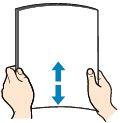
 If paper is curled, hold the curled corners and gently bend them in the opposite direction until the paper becomes completely flat.
If paper is curled, hold the curled corners and gently bend them in the opposite direction until the paper becomes completely flat.
-
Open the rear tray cover (A). The paper output slot cover will open automatically.
-
Pull out the paper support (B) until the arrow right arrow marker
 is aligned with the left arrow marker
is aligned with the left arrow marker
 .
.
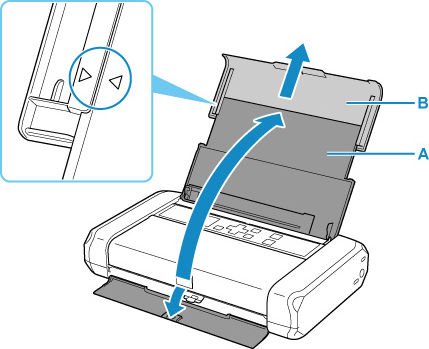
-
Slide the paper guide (C) to the left, and load the paper against the far right (D) of the rear tray with the print side facing you.
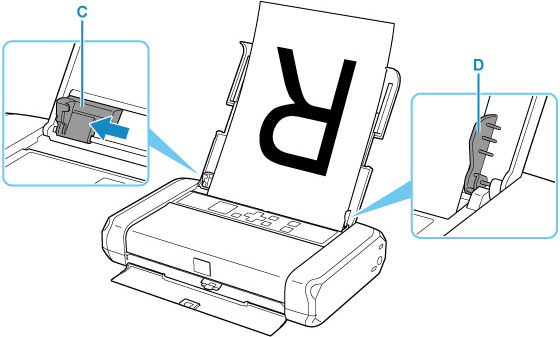
-
Slide the paper guide to align it with the paper stack. Do not slide the paper guide too hard against the paper. The paper may not feed properly.
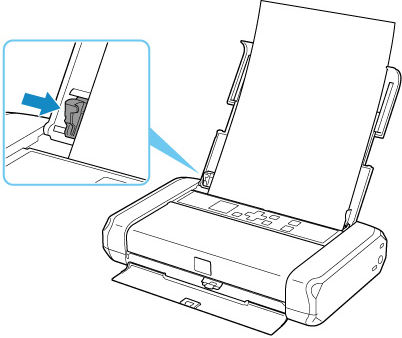
 Always load paper in portrait orientation (E). Paper loaded in landscape orientation (F) can cause paper jams.
Always load paper in portrait orientation (E). Paper loaded in landscape orientation (F) can cause paper jams.
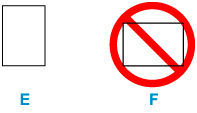
-
Keep the paper stack height below the tab (G) of the paper guide.
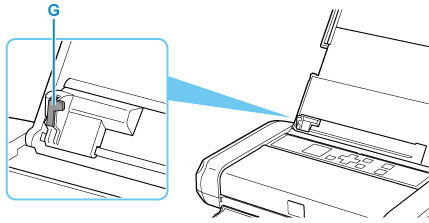
- Set the paper thickness lever (H) to the right.
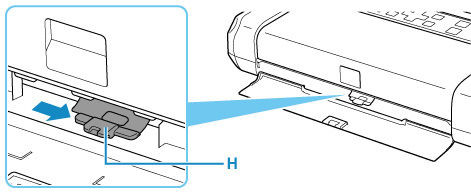
 If the corners or edges of the paper are smudged, try to print with the paper thickness lever set to the left. It may improve print quality. Reset the paper thickness lever to the right when you finish.
If the corners or edges of the paper are smudged, try to print with the paper thickness lever set to the left. It may improve print quality. Reset the paper thickness lever to the right when you finish.
-
After you close the feed slot cover, the paper setting confirmation screen for the rear tray appears on the LCD.
-
If the page size and media type on the LCD match the size and type of paper loaded in rear tray, select OK. If not, select Change to change the settings to match the size and type of the loaded paper.
 There are various types of paper, such as paper with a special surface coating for photo prints at optimal quality and paper suitable for documents.
There are various types of paper, such as paper with a special surface coating for photo prints at optimal quality and paper suitable for documents.
-
Each paper type has specific preset settings (how ink is used and sprayed, distance from nozzles, etc.), that allow you to print with optimal image quality.
-
The wrong paper settings may cause poor color quality or scratches on the printed surface.
-
If the prints are blurry or have uneven colors, increase the print quality setting and print again.
-
To prevent incorrect prints, the printer has a function that detects whether the settings for the paper loaded on the rear tray matches the paper settings. When this function is enabled, an error message is displayed to prevent incorrect prints. Review and correct the paper settings and print again.
If your product issue was not resolved after following the steps above, or if you require additional help, please create or log in to your Canon Account to see your technical support options.
Or if you still need help, visit our Canon Community by clicking the button below to get answers:

____________________________________________________________________________________________



